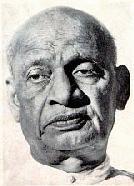|
Patel was not much enamoured
of the concept of secularism
 Fifty years after India won freedom, the myth that Sardar Patel
was anti-Muslim persists. In this fascinating essay,Dr Rafiq Zakaria,
the respected scholar, reveals the truth about Patel
and India's Muslims.
Fifty years after India won freedom, the myth that Sardar Patel
was anti-Muslim persists. In this fascinating essay,Dr Rafiq Zakaria,
the respected scholar, reveals the truth about Patel
and India's Muslims.
Patel was, however, not much enamoured of the concept of secularism,
he used the word rarely; its western connotation, which downgraded
religion, was not much to his liking. Though not a deeply religious
man, he was proud of his Hindu heritage. But like his master,
his Hinduism was not narrow; he respected other religions and
had no quarrel with the nation's composite character. But it had
to harmonise with the mainstream; the minorities must reconcile
to being an integral part of it. He could not understand their
fear that in the process, their identities might suffer.
He failed
to appreciate that because Hinduism was a vast ocean, with limitless
powers of absorption, there was always the danger that it could
encompass, embrace and finally absorb other religions, thus destroying
their cultural identities. Hence the conflict that had occasionally
arisen between Hinduism and other religions. This had not been
confined to Islam alone but also to earlier religions like Buddhism
and Jainism. But it is a tribute to Hinduism that, despite its
all-embracing nature and the occasional conflicts that it encountered
with other faiths, it has refrained from being monolithic. Its
base has remained as elastic as ever before.
Of that Patel seemed
to be aware; that was why he opposed Veer Savarkar's concept of
a Hindu raj, it violated, according to the Sardar, the
basic structure of Hinduism. He was one of the framers of India's
Constitution, his was the major role in incorporating many of
the basic precepts which Hindus had inherited from their past.
One of these was Sarv Dharma Sambhava: equal respect to all religions.
And equal treatment to their followers.
He had affixed his signature
to the document which has enshrined these values; they have distinguished
India, he said, from rest of the world. He publicly declared,
in February 1949, that all talk of Hindu Raj was a 'mad
idea'; he was sure that his country, in the remoulding of
which he had played such a notable part, would never subscribe
to it. In his unforgettable words: 'It will kill the soul
of India.'
Tough, determined, uncompromising and even unforgiving at times,
the Sardar was not vengeful; what Wordsworth said applies aptly
to him:
In him the savage virtue of the race,
Revenge and ferocious thoughts were dead;
Nor did he change; but kept in lofty place
The wisdom which adversity had bred.
Excerpted from Sardar Patel and Indian Muslims, by Rafiq Zakaria, Bharatiya Vidya Bhavan, 1996, Rs 125, with the author's permission. Readers interested in buying a copy of the
book may write to Bharatiya Vidya Bhavan, Kulapati K M Munshi Marg, Bombay 400 007.
|

